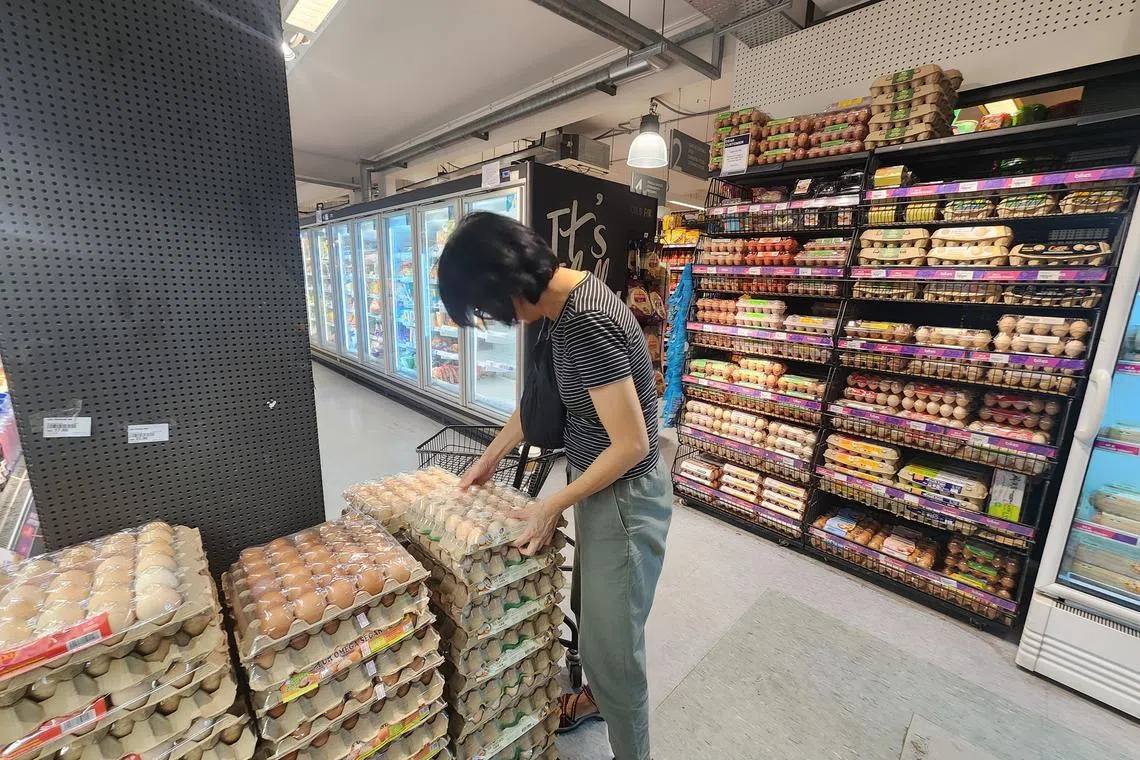Malaysia to remove egg subsidy from Aug in move that boosts govt finances, but may hurt consumers
Sign up now: Get insights on the biggest stories in Malaysia

Malaysia implemented subsidies and price ceilings in February 2022 for chicken and eggs, whose prices had surged owing to supply shortages.
ST PHOTO: HAZLIN HASSAN
KUALA LUMPUR – The Malaysian government will fully remove subsidies for chicken eggs from August, a move that is expected to save it RM1.2 billion (S$363 million) annually, but will hurt consumers already grappling with rising costs of living, analysts say.
Egg producers now receive a subsidy of 10 sen an egg, which costs the government about RM100 million monthly, or RM1.2 billion a year. This payment will be reduced in phases, beginning with a 50 per cent, or five sen, reduction from May 1, followed by the complete removal of subsidies and price controls from Aug 1.
Malaysia now imposes ceiling prices for eggs, ranging from 38 sen to 42 sen each, depending on their grade and quality. Analysts estimate that prices will rise by about three sen an egg when subsidies and price controls are removed.
The Agriculture and Food Security Ministry said the decision was made after careful consideration of market stability.
“This decision was made after taking into account the industry’s commitment to ensuring sufficient and stable egg production, as production costs have stabilised,” it said in a statement on April 30.
“This was evident during the recent Hari Raya Aidilfitri festive season, where supply remained sufficient and prices were competitive.”
The ministry added that a special egg grade will be made available at a reasonable cost, without giving details.
While the market impact may not be significant, analysts warned that the psychological effect could hit hard for consumers already wrestling with rising costs.
The move to remove the egg subsidy is tied to the Malaysian government’s larger plan to wean consumers off dependence on government largesse to tamp down living costs, as it tries to strengthen the country’s finances.
The Anwar Ibrahim administration, which came to power in late 2022, has been slammed by its critics for being too slow in carrying out economic reforms. Such reforms, however, risk sparking public backlash and voter discontent.
“I can understand why they did it, but it is not a politically smart thing to do to remove the subsidies of eggs because Malaysians eat a lot of eggs,” Asian studies professor James Chin of the University of Tasmania told The Straits Times.
“What I would have liked to see is that maybe they could have reduced it to 2.5 sen an egg. They should still subsidise eggs because a lot of poor people see eggs as a major source of protein.”
Malaysia implemented subsidies and price ceilings for chicken and eggs in February 2022, in a bid to stabilise prices, which had surged owing to supply shortages. This was partly due to the Ukraine war, which interrupted global shipments of wheat and corn, which are vital ingredients for chicken feed.
Subsidies and price controls for chicken were lifted in November 2023.
“The markets will celebrate this as (Anwar’s) commitment to subsidy reform, but this is a move that is politically very bad. They should go after big subsidies. The egg subsidy is not that much in the overall scheme of things,” Prof Chin said, adding that the price of eggs is rising in other countries such as Australia and the US.
Other big-ticket economic reforms in the works include the removal of subsidies for petrol, which has cost the government up to RM50 billion a year, as well as a plan to expand the sales and service tax. Both plans have been delayed.
Some analysts anticipate that the removal of subsidies will lead to a small price increase of about three sen an egg. They say this modest rise is due to current lower production costs.
Nevertheless, the price increase will affect low- to middle-income households more, with eggs typically being the cheapest source of protein available.
While a three sen increase per egg may seem negligible, it could significantly affect large families who consume up to a dozen eggs daily, said Professor Emeritus Barjoyai Bardai of Universiti Tun Abdul Razak’s Graduate School of Business.
“Eggs have become a very important and cheap protein source. We should encourage households to take more eggs compared with pricier protein such as fish and beef,” he added.
Retailers like hypermarket chain Mydin have welcomed the move. Its managing director Ameer Ali Mydin said allowing market forces to determine prices could lead to a more sustainable poultry industry.
“During excess supply, this is a good time to remove the price control and egg subsidy as there is an abundance of eggs in the market,” he told ST, noting that current trends indicate a stable supply and declining prices.
In March, during the fasting month of Ramadan, prices fell to as low as RM6 for 30 C-grade eggs because of reduced demand.
Bank Muamalat Malaysia chief economist Mohd Afzanizam Abdul Rashid agreed that average egg prices have been declining, falling by up to 13 per cent in February.
“Clearly this has opened up the window of opportunity for the government to remove the subsidies since the prices are on a downward trend,” he said.
Hazlin Hassan is Malaysia correspondent at The Straits Times.



